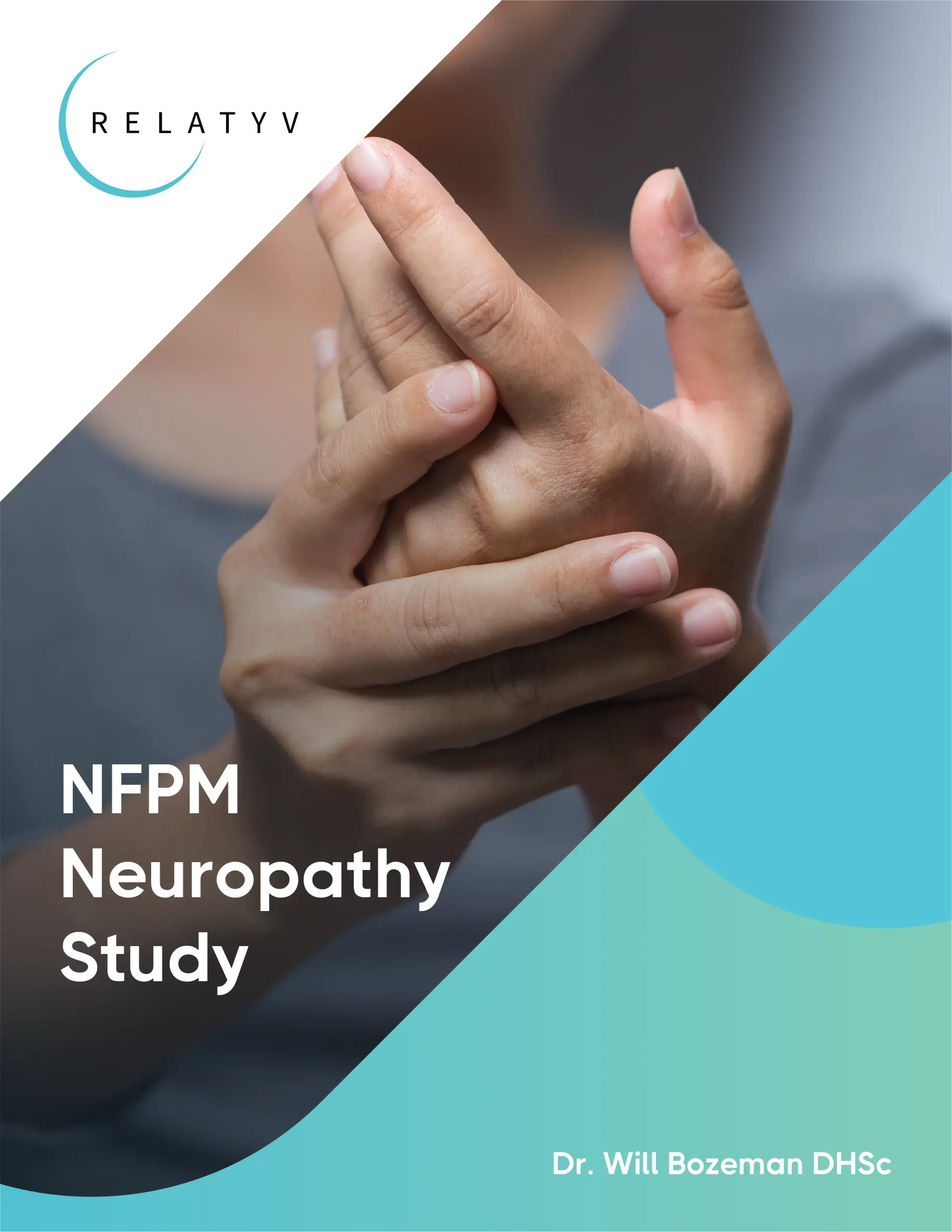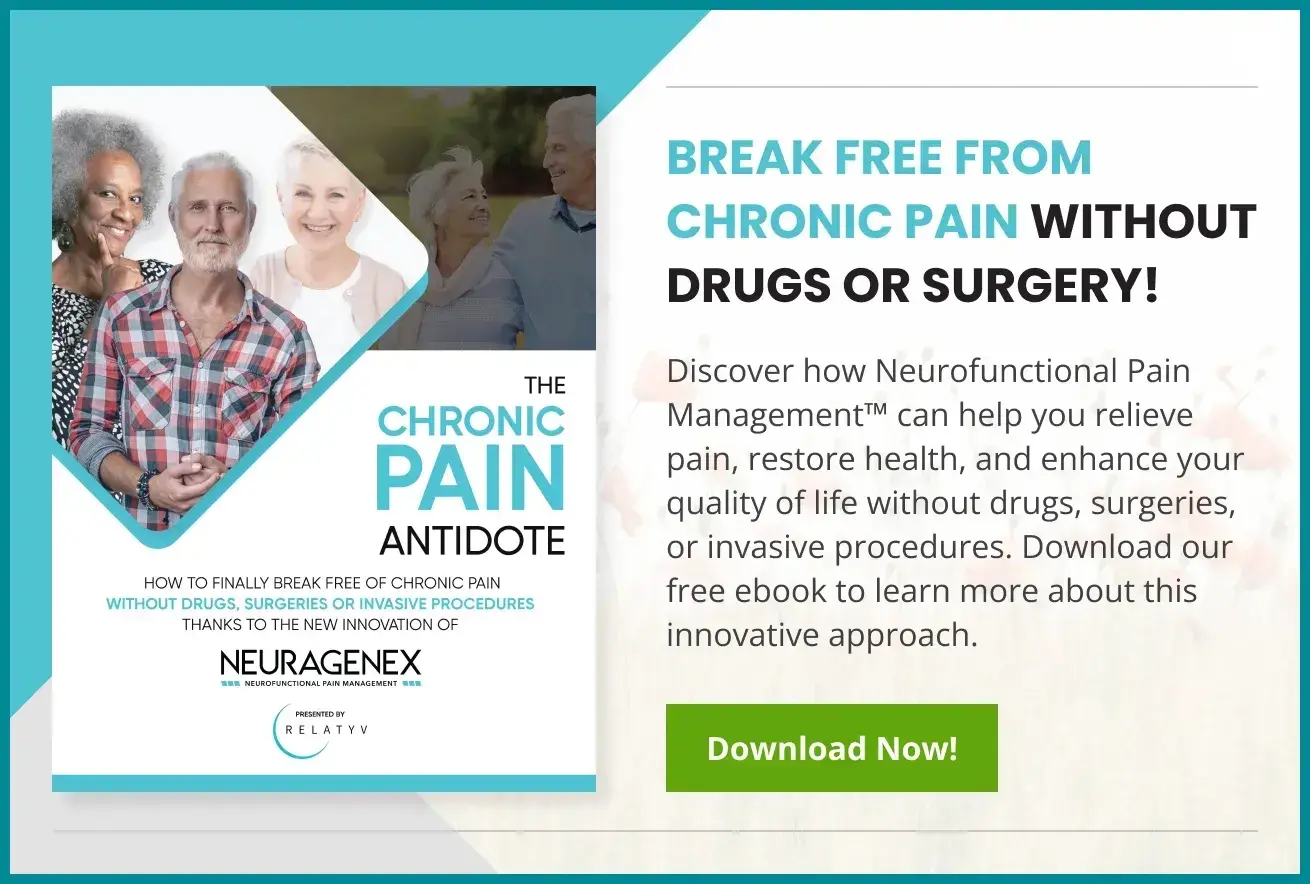Hip Pain

Why TENS Unit For Hip Pain May Not Be Your Best Treatment Option
Read More
May 25, 2023
While transcutaneous electrical nerve stimulation (TENS) units are commonly used for pain management, they may not be the most effective treatment option for hip pain. When it comes to hip pain, the underlying causes are often complex and diverse, including issues with the joint, muscles, tendons, or nerves.
Hip pain may require a more comprehensive approach that addresses muscle imbalances, joint instability, or structural abnormalities, which TENS units alone cannot address. For more effective and targeted relief from hip pain, Relatyv has the solution.
But first, let’s get into why TENS units are not nearly as effective at relieving hip pain as some might hope.
A TENS unit is a small electronic device used for pain management. It consists of a battery-powered control unit connected to electrodes that are placed on the skin near the site of pain. TENS units are commonly used to alleviate various types of acute and chronic pain, including muscle and joint pain.
The principle behind TENS therapy is to deliver low-voltage electrical currents to the body, specifically targeting the nerves responsible for transmitting pain signals. The unit produces gentle electrical impulses that are transmitted through the electrodes to the underlying tissues. These impulses can stimulate the nerves in the area, providing a tingling or buzzing sensation.
The electrical currents emitted by a TENS unit have adjustable parameters such as frequency, intensity, and duration. These settings can be modified based on the individual’s needs and comfort level. The low voltage used in TENS units is typically in the range of 5-100 milliamperes (mA), which is significantly lower than the voltages used in other medical applications.
When the electrical impulses are delivered to the skin, they can potentially interfere with the transmission of pain signals to the brain. The stimulation from the TENS unit is thought to activate the body’s natural pain-relieving mechanisms, such as the release of endorphins, which are the body’s natural painkillers.
By disrupting or overriding pain signals, TENS therapy aims to provide quick and temporary pain relief as well as promote a sense of well-being.
While TENS units are commonly used for pain management, they may not be the most effective treatment option for hip pain. Hip pain often involves complex underlying causes that require a more comprehensive approach. TENS units primarily target surface-level pain and may not reach deep enough to address the root cause of hip pain.
Additionally, hip pain may require a multifaceted treatment plan that addresses muscle imbalances, joint instability, or structural abnormalities. TENS units, which deliver low-voltage electrical currents, may not provide the targeted relief needed for hip pain.
Let’s get into more detail on TENS lack of efficacy below:
TENS units may not effectively penetrate deep enough to reach the source of hip pain due to their low voltage. The electrical impulses generated by TENS units are typically of low intensity, typically in the run at 400 pulses per second. While these currents can provide surface-level stimulation and potentially block pain signals transmitted by superficial nerves, they may not effectively reach the deeper tissues or structures within the hip joint that could be contributing to the pain. Hip pain often originates from deeper structures such as the joint capsule, ligaments, tendons, or deep muscles. These areas may require more targeted and higher-intensity electrical stimulation than what a TENS unit can provide.
TENS units may not be as effective for chronic or degenerative pain conditions. While these devices can provide temporary pain relief for acute or short-term pain, their efficacy in managing chronic or degenerative pain may be limited. Additionally, chronic pain conditions often require a multidisciplinary approach that combines various treatment modalities, such as physical therapy and lifestyle modifications. TENS units alone may not address the multifaceted nature of chronic pain or provide the comprehensive management needed for sustained relief.
TENS unit treatments, while generally considered safe, can sometimes be associated with certain side effects. Here are some common side effects that may occur during or after TENS unit sessions:
Prolonged or repeated use of TENS electrodes can sometimes cause skin irritation or redness at the site of application. This can be due to the adhesive properties of the electrodes or the electrical stimulation itself. Proper electrode placement, ensuring clean and dry skin, and using hypoallergenic electrodes can help minimize the risk of skin irritation.
TENS therapy involves stimulating nerves and muscles with electrical impulses. In some cases, muscle twitching or involuntary muscle contractions may occur during the treatment. This is typically temporary and subsides once the TENS unit is turned off. Adjusting the intensity or frequency settings on the device may help reduce muscle twitching if it becomes bothersome.
The electrical stimulation produced by TENS units often creates a tingling or buzzing sensation at the site of application. While this sensation is generally well-tolerated, it can sometimes be uncomfortable for some individuals. Modifying the intensity or frequency of the TENS unit can help adjust the tingling sensation to a more comfortable level.
While TENS units are generally safe for most individuals, there are certain groups of people who should not use them or exercise caution when doing so due to potential risks to their health. Here are some examples:
People With Implanted Medical Devices
Individuals with implanted medical devices, such as pacemakers, defibrillators, or neurostimulators, should avoid using TENS units without consulting their healthcare provider. The electrical impulses from TENS units can potentially interfere with the functioning of these devices, leading to malfunction or inadequate therapy.
Pregnant Women
The safety of TENS therapy during pregnancy is not well-established, and its effects on the developing fetus are not fully understood. Therefore, it is generally advised that pregnant women avoid using TENS units, especially in the abdominal or pelvic regions, unless specifically recommended by their healthcare provider.
Individuals with Epilepsy or Seizure Disorders
TENS therapy involves electrical stimulation, which can potentially trigger seizures in individuals with epilepsy or seizure disorders. Therefore, it is essential for individuals with such conditions to avoid using TENS units without the guidance and approval of their healthcare provider.
People with Sensory Impairments or Skin Sensitivities
Individuals with reduced or altered sensation in the areas where TENS electrodes are applied may not be able to properly perceive the intensity of the electrical stimulation. This can lead to inadvertent overstimulation or skin damage. Similarly, individuals with skin sensitivities or open wounds should exercise caution when using TENS units to avoid skin irritation or worsening of their condition.
Individuals With Undiagnosed Pain
TENS units should not be used as a substitute for medical evaluation and diagnosis. If the cause of pain is unknown or not properly diagnosed, using TENS units without understanding the underlying condition can potentially mask symptoms or delay appropriate medical intervention.
It is crucial to consult with a healthcare professional before using a TENS unit, especially if you fall into one of the high-risk categories mentioned above. However, it is a good rule of thumb to presume that TENS units could be doing more harm than good, which is discussed in more detail here.
While TENS units have their limitations for treating hip pain, there are alternative treatment methods that have shown effectiveness in managing hip pain. These methods offer a more comprehensive approach to address the underlying causes of hip pain. Some treatment options that may be considered include:
Physical Therapy
Physical therapy is often recommended for hip pain as it focuses on strengthening the muscles around the hip joint, improving flexibility, and correcting imbalances. A physical therapist can design a personalized exercise program that targets specific areas contributing to hip pain, helping to alleviate symptoms and improve overall hip function.
Medications
Nonsteroidal anti-inflammatory drugs (NSAIDs) and analgesics can help reduce pain and inflammation associated with hip pain. These medications are available over-the-counter or by prescription, depending on the severity of the pain and individual needs. It’s important to consult with a healthcare professional for appropriate medication recommendations and to ensure proper usage.
Injections
Corticosteroid injections or hyaluronic acid injections may be considered for individuals with hip pain that do not respond to conservative treatments. These injections can provide temporary pain relief and reduce inflammation in the hip joint. However, it is important to note that their effects are typically temporary, and repeated injections may have diminishing returns.
Assistive Devices
The use of assistive devices such as canes, crutches, or walkers can help offload the weight from the hip joint, reduce pain, and provide support during activities. These devices can help improve mobility and reduce the strain on the hip joint, particularly in cases of hip osteoarthritis or post-surgical rehabilitation.
Surgical Intervention
In cases where conservative treatments fail to provide adequate relief, surgical intervention may be considered. Surgical options range from minimally invasive procedures, such as arthroscopy, to more extensive procedures like joint replacement surgery. The type of surgery will depend on the underlying cause and severity of the hip pain.
These treatments for hip pain are slightly more effective and may even be safer but they cannot offer the same solutions provided by Relatyv.
Relatyv uses the Neurofunctional Pain Management approach to manage hip pain. This is a whole-person treatment that focuses on providing maximum relief from hip pain; starting with electroanalgesia and moving to IV therapy and lifestyle counseling.
Relatyv offers the most effective form of electrical stimulation and pain relief through electroanalgesia. Not only is it safe and effective at treating hip pain, its efficacy outweighs that of a TENS unit. Its efficacy, when compared to a TENS unit, is directly related to its high-pulse stimulation which is 10,000 pulses per second compared to a TENS unit’s 400 pulses per second. Electroanalgesia, with its high-pulse electrical stimulation, creates a depolarization effect on the pain neurons, while also stimulating tissue regeneration that repairs damaged nerves and damaged microvascular tissues in the hip.
Relatyv also offers a specialized nutritional hydration therapy of vitamins, minerals, and other nutritional necessities that assist the body’s immune system and its ability to relieve hip pain. This specialized nutritional hydration therapy works in conjunction with electroanalgesia’s ability to effectively relieve the pain with lasting results.
Patients who seek the most effective form of relief from hip pain will undoubtedly find it with our treatment program and attain the ability to maintain their pain in the interim by participating in our educational and lifestyle counseling. These programs ensure patients will have the ability and confidence to do all they can to mitigate the often debilitating endometriosis pain.
When experiencing hip pain, it is crucial to consult with a medical professional to seek effective relief and ensure proper management of your condition. Here are the reasons why consulting with a medical professional is essential:
A medical professional, such as an orthopedic specialist or a primary care physician, can conduct a thorough evaluation to accurately diagnose the underlying cause of your hip pain. Hip pain can stem from various conditions, including osteoarthritis, bursitis, tendinitis, hip labral tears, or referred pain from other areas. Obtaining an accurate diagnosis is crucial for developing an appropriate treatment plan tailored to your specific condition.
Healthcare professionals can provide a personalized treatment plan based on your diagnosis, medical history, and individual needs. They can consider various factors, such as the severity of your hip pain, functional limitations, and any underlying health conditions that may impact your treatment options. A personalized approach ensures that you receive the most effective and appropriate interventions for your specific situation.
Medical professionals have access to a range of resources and specialists who can contribute to the management of your hip pain. They can refer you to physical therapists, pain specialists, or orthopedic surgeons if necessary, ensuring that you receive comprehensive care and access to specialized treatments.
Consulting with a medical professional allows for ongoing monitoring of your condition and the effectiveness of your treatment plan. They can assess your progress, modify your treatment approach if needed, and provide guidance on lifestyle modifications, exercises, or pain management techniques to optimize your recovery.
Healthcare professionals are trained to assess potential risks and complications associated with different treatment options. They can evaluate your medical history, medication use, and other factors to ensure that the chosen interventions are safe and suitable for you. This is particularly important if you have pre-existing medical conditions or take certain medications that may interact with specific treatments.
Seeking guidance from a medical professional is crucial to ensure that you receive the most effective and appropriate care for your hip pain. They have the expertise and knowledge to guide you through the diagnosis process, recommend evidence-based treatments, and monitor your progress to help you achieve optimal pain relief and improved hip function.
At Relatyv, we understand that hip pain can be life-limiting and preclude many from living the full-fledged life they had imagined. At the same time, we know and have confidence that pain relief will come through electroanalgesia, IV therapy, and educational programs. At Relatyv, our mission is to relieve pain, restore health, and magnify the quality of life while operating as a non-pharmaceutical, non-surgical, non-invasive, and non-chiropractic pain treatment provider. Our vision is to be the first thought, first choice, and first step in the journey of chronic pain relief.
About the Author
Will is a healthcare executive, innovator, entrepreneur, inventor, and writer with a wide range of experience in the medical field. Will has multiple degrees in a wide range of subjects that give depth to his capability as an entrepreneur and capacity to operate as an innovative healthcare executive.
Share on Social Media



You can see how this popup was set up in our step-by-step guide: https://wppopupmaker.com/guides/auto-opening-announcement-popups/
You can see how this popup was set up in our step-by-step guide: https://wppopupmaker.com/guides/auto-opening-announcement-popups/
Neurofunctional Pain Management Overview
Symptoms
Conditions Treated
Treatments
Articles by Category
Locations
Colorado
Wisconsin
Georgia
Hiram
Lawrenceville
Marietta
Powder Springs
Texas
Waco
Victoria
Illinois
Buffalo Grove
New Lenox
St. Charles
Arizona
Tucson
Waddell
Arlington
Avondale
Buckeye
Superior
Mesa
Palo Verde
Morristown
Tempe
Chandler
Anthem
Eloy
Florence
Fort McDowell
Phoenix
El Mirage
Coolidge
Gilbert
Arizona City
Casa Grande
Casa Blanca
Aguila
Sacaton
Apache Junction
Kearny
Stanfield
Goodyear
Litchfield Park
Alabama
Arkansas
California
Florida
Idaho
Indiana
Iowa
Kansas
Louisiana
Maryland
Michigan
Rhode Island
Minnesota
Mississippi
Nevada
New Jersey
New Mexico
North Carolina
Ohio
Pennsylvania
South Dakota
Tennessee
Utah
Virginia
Washington


